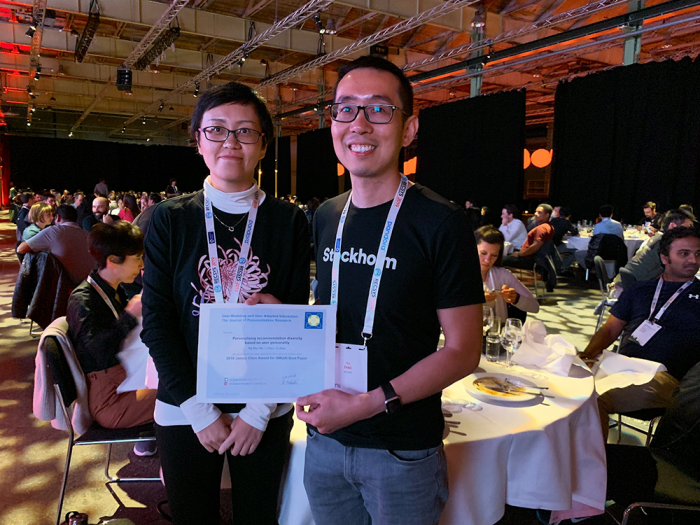Spotify at RecSys 2019

Spotify was out in full force at RecSys in Copenhagen. The ACM Conference on Recommender Systems (RecSys) is the premier international forum for the presentation of new research results, systems and techniques in the broad field of recommender systems, a very important topic for us at Spotify. We gave three talks, were part of a panel, and presented a half-day tutorial. It was inspiring to be a part of the wider community pushing forward recommender system technology, both at Spotify and in the global research community.
Responsible Recommendation Panel
Henriette Cramer sat on a panel with other researchers to begin answering how we can build, deploy, and study recommender systems responsibly. As the manager of Spotify’s algorithmic responsibility effort, Henriette provided an industry perspective on creating recommendation systems that promote human welfare. Topics included how to communicate research to influence decision making, and gaps between research frameworks and practical needs. The discussion varied from recommender system implementation and modeling choices, to whether recommender companies have a responsibility to look at their broader societal impact independently of their own users’ satisfaction.
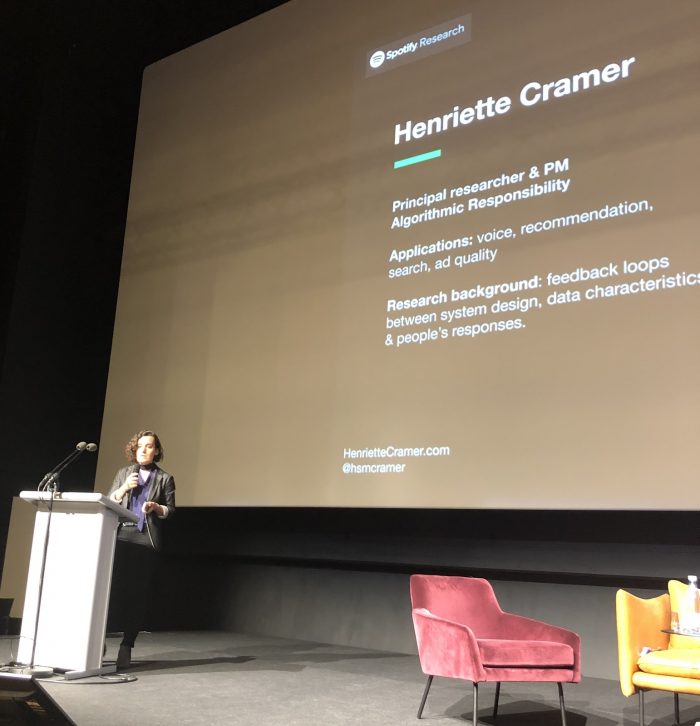
Industry Session: Home Page Personalization at Spotify
Oguz Semerci delivered a talk explaining the methods and technologies used to personalize the Homepage in Spotify. Oguz introduced the Homepage and how we organize and select content for users. Other topics discussed included the drawbacks of self-perpetuating feedback loops in Machine Learning systems and how his team uses randomization and exploration to minimize these drawbacks. His team has developed simple and informative metrics they use as “sanity checks to validate the model’s ability to account for users’ habitual behaviors. If you’re interested in discovering more about the talk, you can view the slide deck.
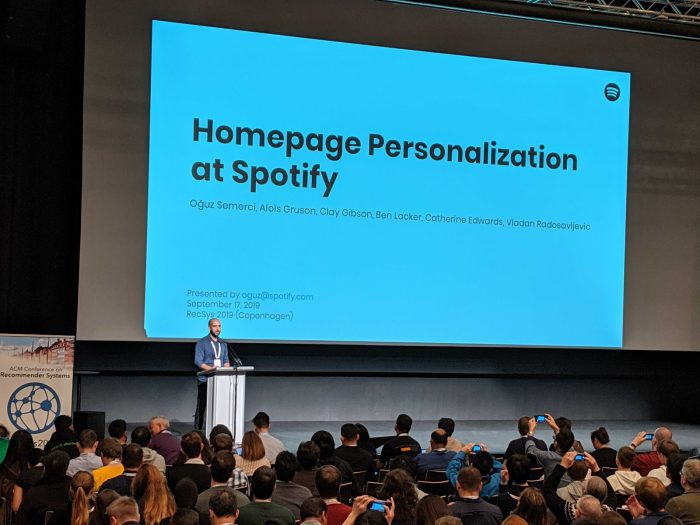
Tutorial: Recommendations in a Marketplace
In Rishabh Mehrotra and Ben Carterette tutorial, they spoke about the research questions that arise when using machine learning to manage interactions between multiple stakeholders, i.e. users, suppliers, rightsholders, the platform, and so on. They discussed how they consider each stakeholder's interests and metrics. Their tutorial began with an introduction and overview of marketplaces, and delved into detailed algorithmic discussion on ML approaches for joint optimization of objectives. A large crowd of industry researchers and practitioners attended the tutorial and contributed to a great research discussion. You can view the online tutorial on Github.
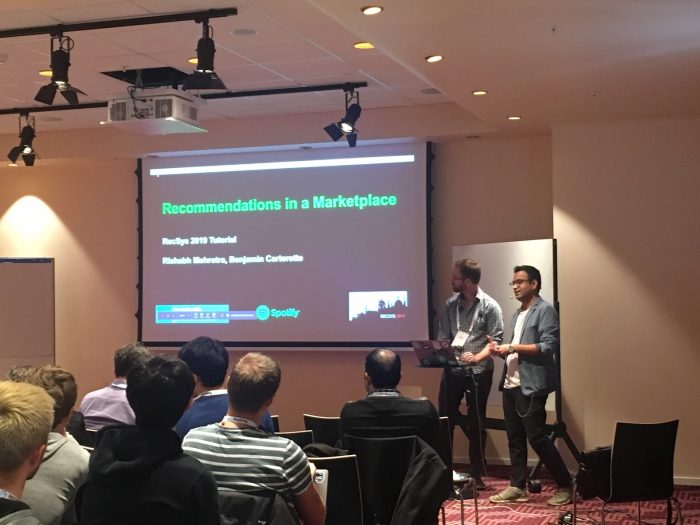
Workshop: Reinforcement and Robust Estimators (REVEAL)
Three Spotifiers presented at the REVEAL workshop on offline evaluation for recommender systems. This year’s focus was on Reinforcement Learning, a research area of great interest to us at Spotify, and we were delighted to share our experiences on this topic.
Personalization via Deep, Meaningful, and Long-Term Learning
Tony Jebara, an invited speaker who recently joined Spotify, was the first presenter. In the talk, Tony covered how Netflix, where he previously worked, evolved the recommender from linear matrix factorization in 2006 to nonlinear deep learning today. Tony explained why it is valuable to personalize the imagery of a recommended title for each user. He shared they accomplished this by using online learning and a multi-arm bandit to highlight the aspects that are the most meaningful to users. However, multi-arm bandits can be shortsighted as they chase instantaneous rewards like clicks and plays. He asked the audience how can we move beyond instantaneous rewards to handle delayed consequences and long-term outcomes like retention? Through reinforcement learning and lifetime value functions, Tony showed that it is possible to train recommendation engines to increase the predicted subscription duration of each member.
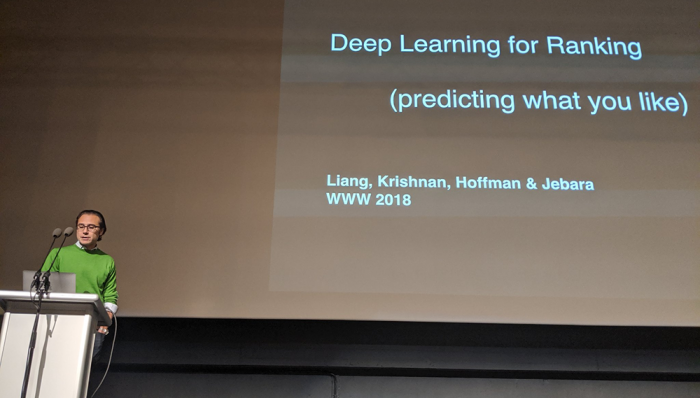
Engagement, metrics and recommenders
Mounia Lalmas hosted the second invited talk regarding the clear connections to what reinforcement learning research is attempting to achieve (defining the rewards), and the metrics that are optimized by recommender systems. Mounia presented various works and personal thoughts on how to develop metrics of user engagement, which recommender systems can optimize for. Her main message was that for recommender systems to work both in the short and long-term, it is important to consider the heterogeneity of both user and content to formalize the concept of engagement, and in turn, design appropriate metrics to capture these and optimize for. She suggested four steps to achieve this:
understanding intents
optimizing for the right metric
acting on segmentation
thinking about diversity.
Check out Mounia’s presentation here.
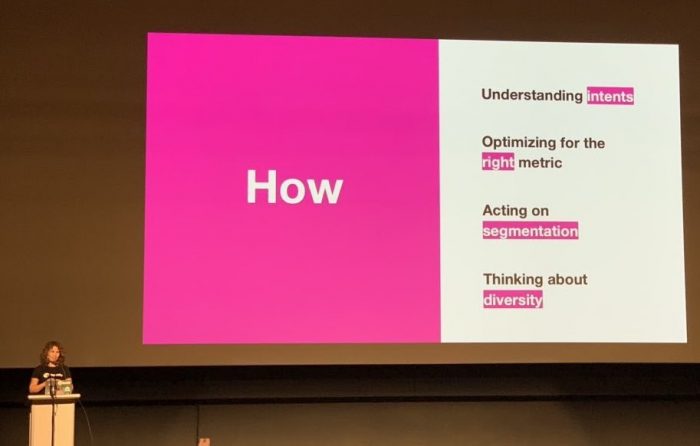
Sequence-aware Reinforcement Learning over Knowledge Graphs
The third talk by Rishabh Mehrotra spoke on a scalable approach to generate recommendations from a large knowledge graph by selecting the best path to traverse in the graph via reinforcement learning. Rishabh described a Reinforcement Learning based approach for recommendations, which casts item recommendation problems as a deterministic Markov Decision Process over the knowledge graph, wherein an agent starts from a user, and learns to navigate to the potential items of interest. The main takeaways from the talk included:
Usefulness of training better embeddings via hierarchical softmax
Helpfulness of incorporating item sequence information when training Reinforcement Learning models
How look-ahead information in Reinforcement Learning results in massive gains in performance.
You can view the slides for his talk here.
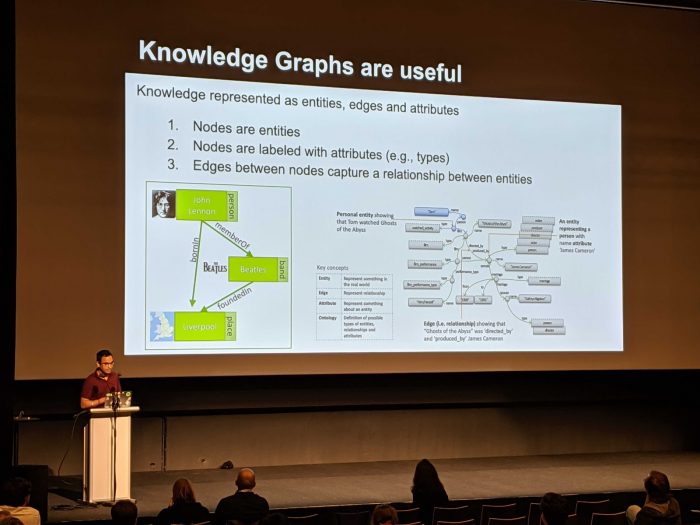
Personalization Journal Best Paper Award
Yu Zhao was awarded the 2018 James Chen award for best paper in the User Modeling and User Adapted Interaction Journal (UMUAI) for his paper, “Personalizing recommendation diversity based on user personality”. He completed this work in his previous role at Douban, the largest media ratings/review site in China, which also runs a music radio service Douban.fm. The paper proposes a generalized, dynamic personality-based re-ranking approach which increases the diversity of recommendations. Congratulations Yu!
